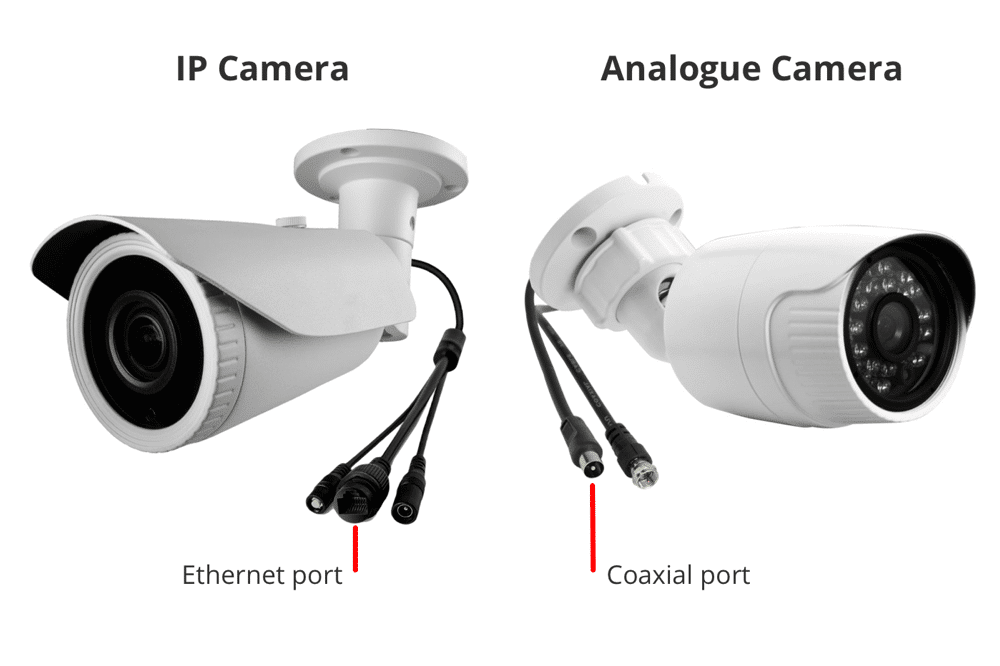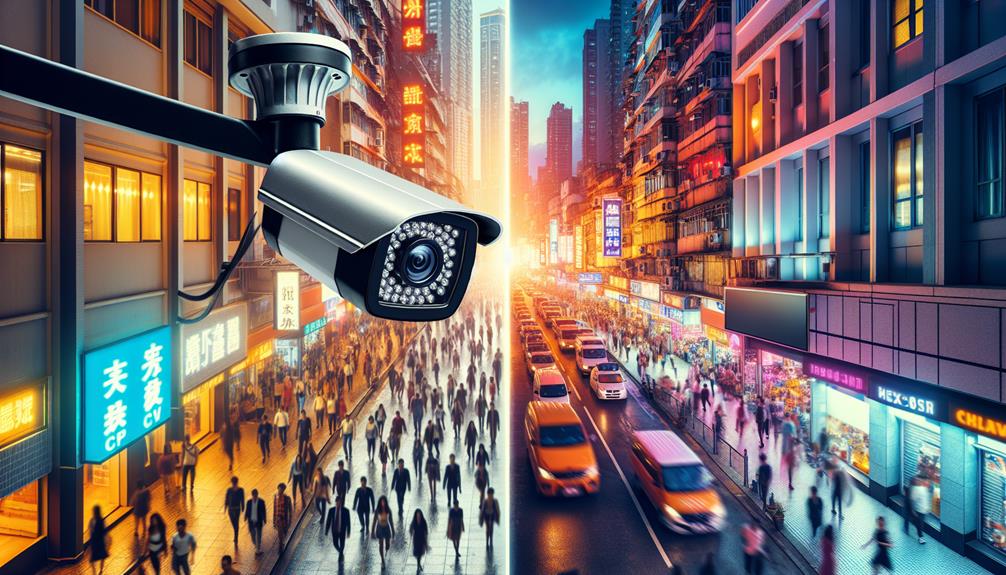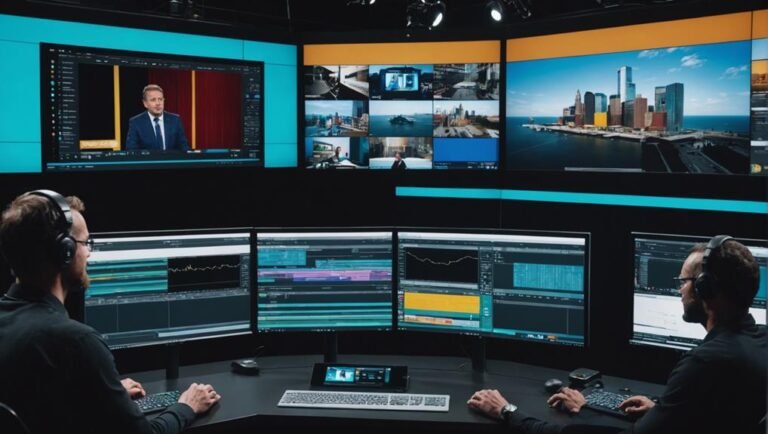When choosing between analog CCTV and IP cameras, consider the benefits and limitations of each. IP cameras deliver higher resolution, clearer images, and better low-light performance compared to analog systems. While IP cameras have higher upfront costs, they save you money long-term through simpler cabling and scalability. Their installation is easier with Power over Ethernet, and they offer remote access, letting you monitor from anywhere. Analog systems often require more maintenance and extensive wiring. IP cameras also provide advanced features like face and object recognition. Want to discover more about maximizing your security?
Image Quality
When comparing image quality, IP cameras offer higher resolution and clearer images than analog CCTV systems. If you’re someone who values freedom and wants to make informed decisions, this is an essential factor. IP cameras provide superior clarity, making it easier to identify faces, license plates, and other details. This means you won’t have to squint at blurry images trying to figure out what’s happening.
IP cameras also come with advanced features like digital zoom. Unlike analog systems, where zooming in means losing clarity, IP cameras maintain high image quality even when magnified. You’ll appreciate this if you need to focus on specific details without compromising the overall picture.
Moreover, IP cameras often come with enhanced low-light performance. So, whether it’s dawn, dusk, or a poorly-lit area, you’ll still get usable footage. This makes sure you’re not restricted by lighting conditions, giving you the freedom to monitor any space effectively.
In essence, if you crave high-quality visuals and the flexibility to adapt to various conditions, IP cameras are the way to go. They offer you not just better image quality, but also the freedom to see your world in greater detail.

Cost Comparison
While IP cameras excel in image quality, it’s important to weigh this against the cost implications. Initially, IP cameras tend to be more expensive than their analog counterparts. They often come with advanced features like higher resolution, enhanced zoom capabilities, and better night vision, which can drive up the price. However, don’t let that deter you just yet.
Analog systems might seem like a cheaper option upfront, but consider the hidden costs. You’ll need more cables, possibly extra recording devices, and they often require more maintenance. Over time, these expenses can add up, eating into your freedom to allocate resources elsewhere.
On the flip side, IP cameras, despite their higher initial cost, can offer long-term savings. They use fewer cables, can integrate with existing network infrastructure, and often have features that reduce the need for additional hardware. Plus, their digital nature allows for easier scalability, giving you the flexibility to expand your system without significant additional costs.
Installation Process
Installing an Analog CCTV system can be cumbersome, requiring extensive cabling and careful placement of recording devices. You’ll need to run coaxial cables from each camera to a central DVR, which can be time-consuming and restrictive. Plus, you must find a way to power each camera. This often means additional wiring, making the setup even more complicated.
In contrast, installing an IP camera system offers a more flexible and streamlined process. You can use Power over Ethernet (PoE) to deliver both power and data through a single cable, reducing the amount of wiring needed. This simplifies the installation and allows you to place cameras in more convenient locations. Additionally, IP cameras often connect directly to your existing network, making setup quicker and less intrusive.
With IP cameras, you also have the freedom to access live feeds and recordings remotely. You won’t be tied down to a specific location to monitor your system, granting you greater flexibility and control. If you value ease and convenience in your security setup, the IP camera system is likely the better choice for you.
Scalability
Scalability is an important factor to take into account when deciding between an Analog CCTV system and an IP camera system. If you’re planning to expand your surveillance setup, IP cameras offer unmatched flexibility. With an IP system, you can easily add more cameras without overhauling your entire infrastructure. Just connect new cameras to your network, and you’re all set. This makes IP cameras ideal if you anticipate growth or changes in your security needs.
On the other hand, Analog CCTV systems can be limiting. Adding more cameras often requires additional cabling and possibly even new recording equipment. This can quickly become cumbersome and costly, especially if your property is extensive. Analog systems are generally better for smaller, static setups where expansion isn’t a priority.
IP cameras also support higher resolutions, which means you won’t have to replace existing cameras as your needs evolve. Analog systems, however, are restricted by their lower resolution capabilities.
In short, if you value the freedom to scale your security system effortlessly, IP cameras are the way to go. They adapt to your changing needs with minimal hassle, giving you peace of mind as your requirements grow.
Remote Access
Have you ever wished you could monitor your property from anywhere in the world? With IP cameras, you can. These modern surveillance systems offer remote access, letting you keep an eye on your home, office, or any important location regardless of where you are. All you need is an internet connection and a compatible device like your smartphone, tablet, or laptop.
Analog CCTV systems, on the other hand, fall short in this area. They typically require a direct connection to a monitor and DVR, limiting your ability to check in when you’re not physically present. IP cameras use digital signals, making it easy to transmit data over the internet securely. You can receive real-time alerts and even control the camera’s angle and zoom remotely.
Imagine the freedom of being able to travel, knowing you can always check your security feed in real time. Whether you’re on a business trip or a vacation, IP cameras provide unparalleled convenience and peace of mind. No more worrying about what’s happening back home—you’ve got it covered from anywhere. If remote access is a priority for you, IP cameras are unquestionably the way to go.
Reliability
While remote access offers unmatched convenience, the reliability of your surveillance system is equally important for ensuring consistent security. Analog CCTV cameras have been around for decades and are known for their stability. They’re less likely to suffer from network issues since they don’t rely on the internet. This makes them a solid choice if you want a no-frills, dependable system.
On the other hand, IP cameras leverage modern networking technology, which can sometimes lead to reliability hiccups. Network congestion or outages can disrupt your security feed, which isn’t something you want when safeguarding your property. However, technological advancements have greatly improved the reliability of IP cameras.
Here are four key points to keep in mind when evaluating reliability:
- Power Supply: Analog cameras usually have a more straightforward power setup, while IP cameras often rely on Power over Ethernet (PoE), which can be disrupted if the network fails.
- Signal Interference: Analog signals can degrade over long distances, while IP cameras maintain quality over extensive networks.
- Redundancy: IP systems often have better options for redundant storage, ensuring footage isn’t lost.
- Maintenance: Analog systems require less frequent updates and patches compared to IP systems, which need regular software maintenance.
In the end, your choice depends on your specific needs and tolerance for potential network-related issues.
Advanced Features
IP cameras shine when it comes to advanced features, offering capabilities like high-definition video, intelligent analytics, and remote access that analog CCTV systems simply can’t match. Imagine having the freedom to monitor your property from anywhere in the world. With IP cameras, you can access live feeds and recordings right from your smartphone or computer, giving you peace of mind and control, no matter where life takes you.
Intelligent analytics is another game-changer. IP cameras can distinguish between different types of movement, reducing false alarms from things like falling leaves or passing animals. They can even recognize faces, license plates, and specific objects, making your security system smarter and more efficient.
High-definition video quality means you won’t miss a single detail. Whether it’s identifying a potential intruder or just checking on your pets, the clarity provided by IP cameras is unmatched. Analog systems simply can’t deliver the same level of detail, often leaving you with grainy, hard-to-interpret footage.
With IP cameras, you’re not just investing in a security system; you’re embracing a lifestyle of freedom and control. Why settle for less when you can have a system that truly empowers you?
Frequently Asked Questions
What Are the Typical Maintenance Requirements for Analog CCTV and IP Cameras?
Maintaining these systems is like tuning a car. For analog CCTV, check cables and connections regularly. For IP cameras, update firmware and software frequently. Keep lenses clean and make sure power sources are reliable for both.
How Do Environmental Conditions Affect Analog CCTV and IP Cameras?
You’ll find weather can mess with both types of cameras. Rain, snow, and extreme temperatures affect image quality and hardware longevity. Invest in weatherproof housings and regular maintenance to keep your surveillance system running smoothly.
Are There Any Privacy Concerns Specific to IP Cameras Compared to Analog Cctv?
You’ll find that IP cameras can pose more privacy concerns because they connect to the internet. Hackers can potentially access your feed remotely, so take precautions like using strong passwords and keeping firmware updated.
What Is the Average Lifespan of Analog CCTV Versus IP Cameras?
You’re probably wondering about camera longevity. Analog CCTV cameras last around 5-7 years, whereas IP cameras typically last 7-10 years. With IP cameras, you get more advanced features and a longer lifespan for your investment.
How Do Analog CCTV and IP Cameras Handle Audio Recording?
Like a musician fine-tuning their instrument, you’ll find that IP cameras handle audio recording more effectively. They offer higher quality and integration options, while analog CCTV systems usually require separate audio equipment, limiting your freedom.



